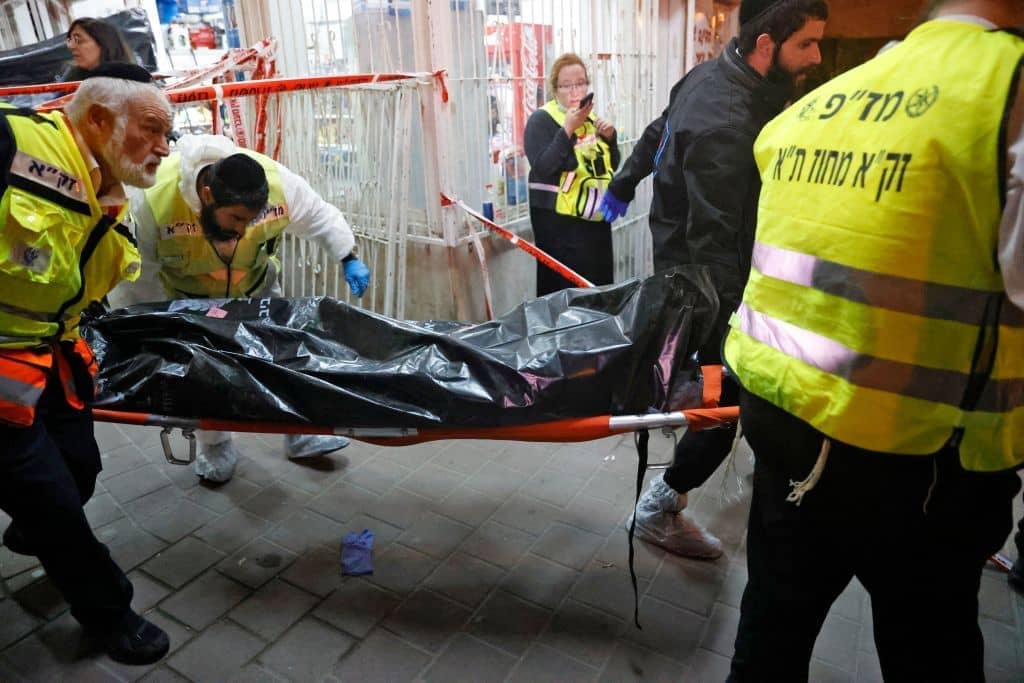Is Israel in the midst of another wave of terrorist violence? Five Israelis were killed in a terrorist incident on Tuesday evening. The attack struck the adjacent cities of Bnei Brak and Ramat Gan; one shooter has so far been identified, a second person has been arrested and the security services reportedly suspect a third might still be at large. It is the third terror attack in a week. Two Border Police officers were shot dead in Hadera on Sunday and four Israelis were stabbed to death in a terrorist incident in Beersheba last Tuesday. That is 11 people killed in seven days and the Jerusalem Post counts the latest killings as the tenth attack this month.
What is particularly concerning for the Israelis is the character of the attackers. The Beersheba assailant, 34-year-old Mohammad Abu al-Qi’an, was from a Bedouin town in the Negev. He had previously served four years for attempting to join the Islamic State. The Hadera killers, cousins Ayman and Ibrahim Ighbariah, were also Israeli Arabs and lived in the city of Umm al-Fahm. Ibrahim was arrested by police in Turkey for trying to join Islamic State in 2016 and later served a year in an Israeli prison. Ayman was arrested by the Shin Bet in 2017 on suspicion of possessing illegal weapons.
What is particularly concerning for the Israelis is the character of the attackers
Two attacks, in a short space of time, both carried out by Arab or Bedouin Israelis with allegiances to the Islamic State. This is why Israeli prime minister Naftali Bennett, announcing measures in response, spoke on Monday of ‘a new situation’. Other than Hamas rockets from Gaza, Israelis still tend to think of terrorism as something that comes from Judea and Samaria (the West Bank). Although their number is far diminished from the heights of the Second Intifada, the last 20 years have seen a string of attacks on victims living in the Israeli-run Area C by terrorists from the Palestinian-run Areas A and B. There has also been a series of terror-motivated slayings by Palestinians infiltrating Israel. The ‘new situation’ Bennett and Israel’s security establishment fears is a wave of terrorism emerging from Arab towns within Israel.
Those fears explain Bennett’s decision to expand the use of administrative detention (detention without charge) inside Israel — ‘in appropriate circumstances in which it is possible to present a proper legal basis’. The practice is widely used against Palestinian terror suspects in Judea and Samaria, which is governed by the Israeli military and where Israeli civilian law largely doesn’t apply. There will also be increased monitoring of extremism on social media, more routine carrying of weapons by army reservists, and additional covert measures. Speaking on Tuesday night, Bennett confirmed this line of thinking:
‘Israel is facing a deadly wave of Arab terrorism… We will fight terror with perseverance, stubbornness, and an iron fist. They will not move us from here. We will win.’
The Bnei Brak/Ramat Gan shootings complicate matters somewhat in that the shooter has been identified as Diaa Hamarsheh, a 26-year-old from Ya’bad, in the far-north of Samaria. He is a Palestinian understood to have been in the country illegally rather than an Arab citizen or legal resident of Israel. What’s more, one of his victims was Amir Khoury, an Arab-Israeli police officer. So far Palestinian Islamic Jihad and Hamas have praised the killings and in Gaza they have handed out the customary sweets given to children when Palestinians murder Israelis. The Shin Bet, roughly equivalent to the FBI, will be searching for any connections to Arab Israeli communities — and, indeed, the Islamic State.
This couldn’t have come at a worse time. Ramadan begins on Saturday and all the major Palestinian terror groups have called for more ‘resistance’ activity. Their hope is to recreate the violence seen this time last year, which included rioting at the Temple Mount in Jerusalem, unrest in Arab-Israeli towns, Hamas rocketing of Israel and retaliatory bombing in Operation Guardian of the Walls.
Today is also Palestinian Land Day and Nakba Day, when Palestinians mark the ‘catastrophe’ of Israeli statehood, still lies ahead on 15 May. Powder keg, tinderbox, time bomb — choose your well-worn but typically apposite metaphor. Israel and the Palestinians have been out of the headlines during the invasion of Ukraine. That may be about to change.







Comments